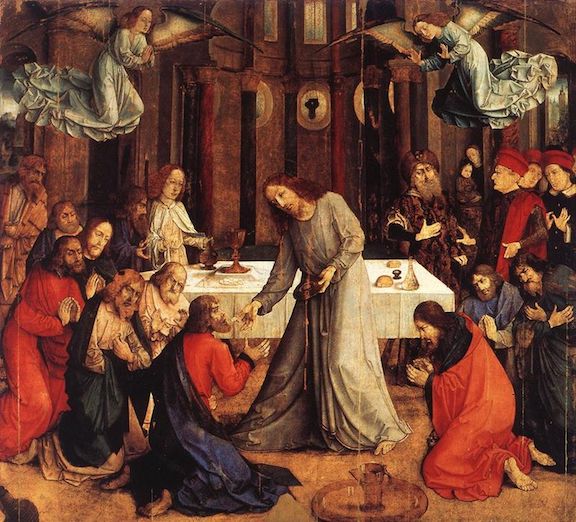One of the great treasures of the Church is the Divine Office. When we celebrate the feast of an Apostle, for example, we say the prayers from the Common of Apostles. The prayers are a window into the Church as we understand it – spiritually, rather than politically. We often get sucked into a political analysis, even in our religious lives, because the political way of thinking is so common in America – and is therefore assumed to be the most powerful way to grasp the truth. It isn’t.
When we celebrate the feast of an Apostle, we pray to the Lord God, for his Holy Church, “founded on the apostles,” where “we are gathered together into your community.” The Apostles are the living foundations whose activities driven by the Spirit of God draw the Church community into being each and every day.
But there’s more: the reading for the Morning Prayer comes from Paul’s Letter to the Ephesians. In that community and in ours too, he says: “You are strangers and aliens no longer.” In secular society, we have all kinds of strategies for keeping a distance from the people whom we do not know. In the communion that is the Church, because of Baptism, we are strangers no longer. We might not know the names of the people with whom we celebrate Mass, but we “are fellow citizens of the saints and members of the household of God.” So we have more in common with them than that which separates us.
In his letter, Paul uses the most concrete, tangible collective terms to explain the unity of people in the Spirit of God: “fellow citizens,” implying sharing the same country; “household”; and “building,” all showing in the strongest possible terms how deeply we are unified. This living, unified entity of which we are part has, on the one hand, the “apostles and the prophets” as its foundation, and then we come to the essential point. This united whole is what it is because “Christ Jesus himself [is] the capstone.” We just do not have words for the wonder of the spiritual unity that is brought about in Christ. It is a unity that we can only get a hint of in faith. There is nothing else like it in history, so our words are stretched to their limit.
Paul explains: “Through him [Christ] the whole structure is fitted together as a holy temple in the Lord.” If we remember that the temple is where the sacrifice was offered, then we “are built into this temple” because of the sacrificial nature of Jesus. We learn the sacrificial life and “become a dwelling place for God in the Spirit.”

In the Evening Prayer, we read from the same Letter to the Ephesians where the unity that we are part of is presented in even more graphic terms. Paul mentions the Apostles etc. who are to serve the faithful and thus build the Church “till we become one in faith and in the knowledge of God’s Son.” And this is where he makes his strongest statement yet as he continues: “and form that perfect man who is Christ come to full stature.” Our oneness is now the oneness of a single individual functioning with one mind and one heart, to be the presence of Christ in what is an angry and contrary world. This is where the doctrine of the Church as the Body of Christ is leading – and where it comes to its fullest expression.
This unity is not based on “I want this” or “I don’t like that person,” or on any of the other assertions of self that spoil the glorious unity of the Body of Christ. Working politically is not working faithfully. Working for my interest is not working for the interest of the Body of Christ.
It is a sorry thing that we have to pray at each Mass that we will grow in love and unity when we do not act to bring that love and unity about in very practical ways.
The Season of Advent is coming shortly. Perhaps we can make an effort to enter into the season in all of the practical ways that are meant to school us in being a united Church – to do some soul-searching in the light of the question “How do I personally promote the unity of the Church?”
After that comes penance with all of the ways that we can make good some of the damage that we have done, praying for people that we “hate,” actually speaking to them and showing them hospitality; preparing for the liturgies of Advent by reading the readings beforehand; by deciding to get to Mass ten minutes earlier for some actual prayer before Mass; setting aside time for things like the Sunday Evening Prayer that so many parishes gather to sing together.
And perhaps most important of all, deliberately choosing to stop thinking politically about the mysteries God Himself as revealed to us in the Church.














